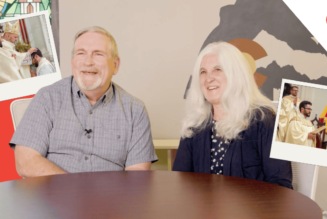, July 23, 2020

“I can only answer the question ‘what am I to do?’ if I can answer the prior question ‘Of what story or stories do I find myself a part?”
That is what Scottish philosopher Alasdair MacIntyre says in his seminal work After Virtue, and it explains why in the Gospel this Sunday, the 17th Sunday of Ordinary Time (Year A) Jesus speaks in parables for the third and final week in a row.
Jesus tells us stories that give our whole life a context, and we need that badly.
Without these stories we are each like Jason Bourne, trying to guess who we are without the most important information.
In the Bourne movies, based on the novels by Robert Ludlum, a man with amnesia is pulled out of the water by a fishing boat at sea. He has no idea who he is, but he soon begins to notice the unusual skills and knowledge he has: He is hyper-observant, memorizes license plates, and fights, climbs, and drives with incredible skill.
He learns more when he opens a safety deposit box assigned to him, filled with false passports, money in different currencies and weapons. They tell a story: He is someone who is paid to live outside the law. But why? Paid by whom? And why are both “good guys” and “bad guys” trying to stop him?
In the 21st century, many of us are Jason Bournes. Much of our religious and cultural memory has been erased, leaving us estranged from faith, family and country. We try to guess who we are from what we have left: Our knowledge, skills and possessions — but that is not enough.
“Deprive children of stories and you leave them unscripted, anxious stutterers in their actions as in their words,” said MacIntyre. You leave them like us.
Along comes Jesus, telling us who we are in the deepest way imaginable.
This Sunday, Jesus says “The kingdom of heaven is like a treasure buried in a field, which a person finds and hides again, and out of joy goes and sells all that he has and buys that field.”
We may think of God as a difficult distant figure we try in vain to reach. That is not our story. Jesus says we can find him right here in our daily life, if we will only dig for him. When we do, he is worth everything we have and makes everything we have worthwhile.
Or, maybe we haven’t found him in our daily work like the man in the field, but have to search him out somewhere else — “like a merchant searching for fine pearls,” says Jesus.
We looked for him in our careers and our own expertise. We looked for him in our politics and passions. We found them all disappointing. But then, like the merchant’s, our search ends, and we redirect everything — our careers, our know-how, our politics and our relationships — to him.
“When he finds a pearl of great price, he goes and sells all that he has and buys it.”
When the Word Made Flesh himself tells these stories, he is not merely pointing out helpful comparisons.
Jesus is the Word, the Logos, the order of the cosmos. He doesn’t tell stories to pass the time, but to give us an insight into the deepest meaning of things. And the deepest meaning of things is that they are created by God to help us become more like God. St. Paul in the Second Reading, from his letter to the Romans, sees this inner logic of reality. “We know that all things work for good for those who love God,” so that we would “be conformed to the image of his Son.”
If Paul’s theoretical language is hard to understand, Jesus makes it easy. Paul says “those he foreknew he also predestined” and “those he predestined he also called.” Jesus simply says “a sower went out to sow, and some weeds fell on good soil.”
Paul says, “those he called he also justified, and those he justified he also glorified.” Jesus says, “The kingdom of heaven is like a treasure buried in a field … a pearl of great price.”
When God came to Solomon and offered him anything he wanted, Solomon asked for Wisdom to know the right way from the wrong way. Jesus gives that same gift to each of us, for free, in the parables. Last Sunday, when Jesus says, “I will open my mouth in parables, I will announce what has lain hidden from the foundation of the world,” he literally means that his stories will reveal the ultimate meaning of our lives.
By knowing the story we belong to, we know exactly what we should do.
But there is a catch. To find wisdom in the parables of Jesus, you have to understand something first.
Three weeks ago, when his apostles ask him point blank, “Why do you speak to them in parables?” he says that while some “look but do not see and hear but do not listen or understand … blessed are your eyes, because they see, and your ears, because they hear.” Jesus this week compares “those who hear” to “the head of a household who brings in from the storeroom both the new and the old.”
What he means is that we should not read the stories in the light of new intellectual fads, but in the context of the stories God has told before. We should see the New Testament in light of the Old.
If you listened to this Sunday’s parables without the right context, you might see it as a call to do whatever is possible to acquire treasure and jewels. But if you have read Sunday’s readings from Wisdom and the Psalms, you have a better idea what Jesus is really saying: That we are to do anything we must to obtain the true treasure in life, God’s will, which is “more precious than thousands of gold and silver pieces.”
The most telling thing about a story is often its ending.
In each of the last three weeks, Jesus hasn’t just told success stories in his parables. He has also told stories of irrevocable failure. He warns us against being fruitless seeds or the weeds that are collected and burned.
This week he compares us to fish caught and pulled into the Church, and warns us against being the fish that are tossed away. There will come a time when “The angels will go out and separate the wicked from the righteous and throw them into the fiery furnace,” he says.
“Man is essentially a storytelling animal,” wrote Alasdair MacIntyre, “a teller of stories that aspire to truth.” Ultimately, the truth we find in the story of the Gospel is this: With Jesus Christ, we have the possibility for great glory. If we lose him, all is lost.
Tags: 17th Sunday of Ordinary Time Year A, prayer, Sunday Gospel, Sunday Readings
Never miss a post! Subscribe below to our weekly newsletter.









